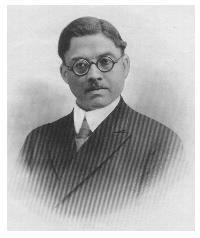

He is a native of the State, having been born at the Capital City, Charleston, on May 2, 1881. So it will be seen that he is just turning into his forties and entering upon the prime of life, though he already has to his credit a record of accomplishment of which a much older man might well be proud.
His father, Joseph Capehart was a merchant, his mother, before her marriage, was Miss Maggie Woodyard. Her people who were slaves in North Carolina, had been manumitted before general emancipation and given some farm land in what is now Logan County, W. Va., where they lived by farming and timbering. The grandfather is still living (1921) at 94.
As a boy, young Capehart laid the foundation of his education in the public schools of the State. Speaking of his condition at this time he says, "Because of having to help to support a widowed mother and five children, I was in dire financial straits which caused me to postpone my education for a number of years." For his literary education he went to Fairview Normal College, Fairview, Ohio. All along through life he has constantly kept before his mind a high ideal for himself in the belief that he can do what any other man can do, and that he is no man's inferior. Of course, he has succeeded. Any man anywhere will succeed who translates that creed into action.
When ready for his law course, he matriculated at the law school of Howard University, where he won his LL.B. degree in 1913. He began the practice in Keystone that same year and was successful from the beginning. In eight years he has built up a law practice of which many an old lawyer would be proud.
In politics, Mr. Capehart is a Republican. Being a man of executive ability, a fluent and forceful speaker and possessing the qualities of leadership, it was natural that he should soon become the party leader of his section. He was elected to the City Council of Keystone, and is now serving his third term, he has also been city assessor for three terms. In 1918, he stood for the State Legislature, was elected and re-elected in 1920. He was an active working member of that body and had various important committee assignments, among which were taxation and finance, claims and grievances, humane institutions and public buildings, educations, rail roads and corporations.
He introduced and steered through to its final passage what is popularly known as the "Capehart Anti-Lynch Law," the most progressive piece of legislation that has been enacted on that important question. It defines "mob" or "riotous assemblage," as "and collection of individuals, five or more in number, assembled for the unlawful purpose of offering violence to the person or property of any one supposed to have been guilty of a violation of the law, or for the purpose of exercising correctional or regulative powers over any person or persons by violence and without lawful authority." The Act clearly defines every term which might leave a loophole for the offender. It makes participation in a mob or riotous assemblage, which results in the putting to death of any one, murder and punishable as such. The act further provides that participation in such a mob or riotous assemblage is punishable by with a fine ranging from a hundred to a thousand dollars and imprisonment of not less than 30 days nor more than 12 months. For damage on person or property, the crime is a felony punishable by imprisonment in the penitentiary. The person or persons damaged have an action against the city or county in which the damage is done up to $5,000.00. In case of lynching, where person lynched has been taken from state, county, of municipal officer, the county shall be subject to forfeiture of $5,000 for the dependents or estate of the deceased and action may be brought in any state court and mandamus issue for the execution of judgement even to the levying of a tax. County may then recover same from negligent officer by action on his bond.
Another piece of race legislation for which he was responsible was a bill to prevent the exhibition of pictures which tend to humiliate or degrade the race.
In 1918, after he had been practicing for about five years, Mr. Capehart entered the real estate field and has since conducted a successful real estate business, with offices at both Welch and Bluefield.
On November 28, 1917, Mr. Capehart married Miss Anna Livingstone Hurley, daughter of Warner and Marie Hurley, of Washington, D. C. They have two children, Harry Jheopart, Jr., and Arthur Froe Capehart. Mrs. Capehart was educated at Washington and was, before her marriage an accomplished teacher.
Mr. Capehart belongs to the Baptist church and among the secret orders is identified with the Odd Fellows, Golden Rule Benevolent Association, and the United Brethren of Friends. His type of mind and trend of thought may be inferred from the fact that his favorite reading consists of the Bible, Tolstoi, Emerson, Doute Goethe, and Blackstone.
He is a careful student of conditions and believes that the permanent progress of the race must rest on education and an enlarged activity in commercial and industrial endeavors.